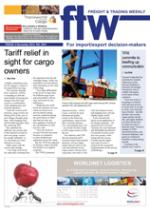Slow steaming by shipping
companies to cut running
costs is impacting
negatively on the logistics
industry as businesses are
forced to adapt to longer
lead times for cargo arriving
by sea.
That’s according to
Samson Nip, Turners
Shipping route development
manager – Far East, who
believes this could have
a negative impact on
inventory levels and lead to
both profit and cash flow
concerns.
Ships which generally
cruise at around 22 knots
have reduced their speed
and now average 18 knots
on a voyage between ports
in the East and South
Africa, says Nip.
“While this reduction
in speed can save up to
20% on the fuel bill, it also
means that instead of the
usual two-week voyage
between ports, ships are
now spending more time at
sea, delaying the delivery of
freight quite substantially.
“We have had to advise
our customers to change
their ordering procedures
to accommodate the longer
lead times,” says Nip.
“The price of bunker fuel,
has been rising steeply, and
has increased by 600% over
the last ten years,” he added.
At a time when
industries are called on
to reduce greenhouse-gas
emissions some countries
are imposing taxes on
emissions, while others
are putting measures in
place to reduce emissions.
Effective this month, ships
in North American waters
are required to burn lowsulphur
oil, which costs
60% more than regular
bunker fuel. Nip says
that this is bound to have
an effect on the cost of
shipping cargo to and from
North America.
Slow steaming impacts logistics industry - Turners
02 Nov 2012 - by Staff reporter
0 Comments
FTW - 2 Nov 12

02 Nov 2012
02 Nov 2012
02 Nov 2012
02 Nov 2012
02 Nov 2012
02 Nov 2012
02 Nov 2012
02 Nov 2012
02 Nov 2012
02 Nov 2012
